Newport Beach Film Festival 2017 Coverage
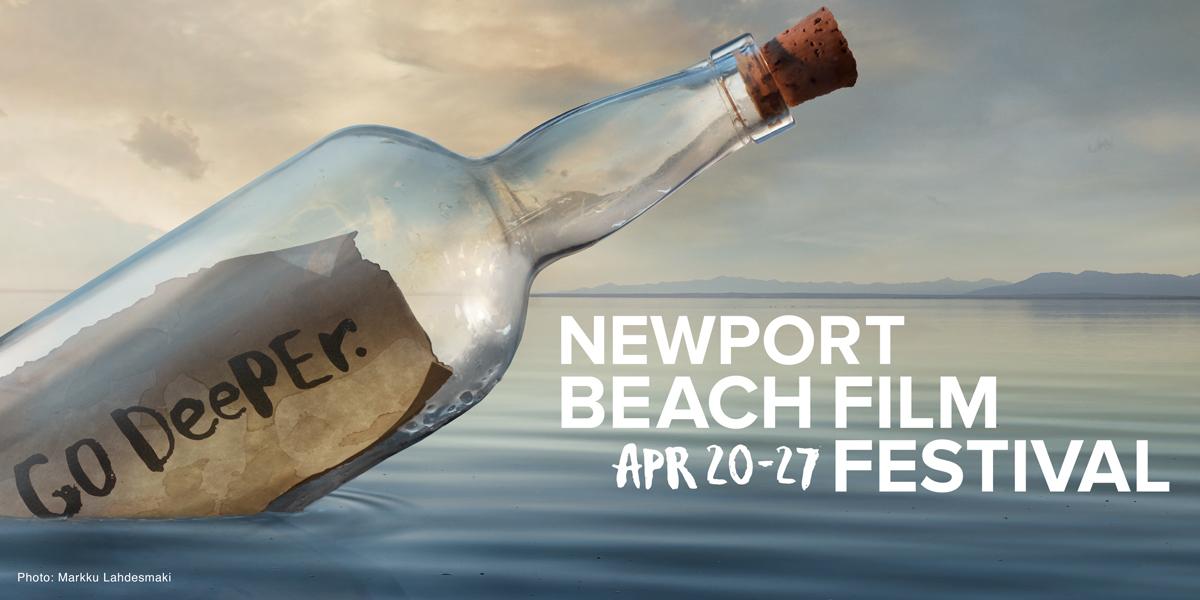
Crossfader Editor-in-Chief Thomas Seraydarian, Film Editor Sergio Zaciu, section editors Carter Moon, Kate Brogden, and Ed Dutcher, and guest contributor John Loftus attended the 2017 NEWPORT BEACH FILM FESTIVAL this year! Here’s a roundup of the films they caught during the festival (listed alphabetically).
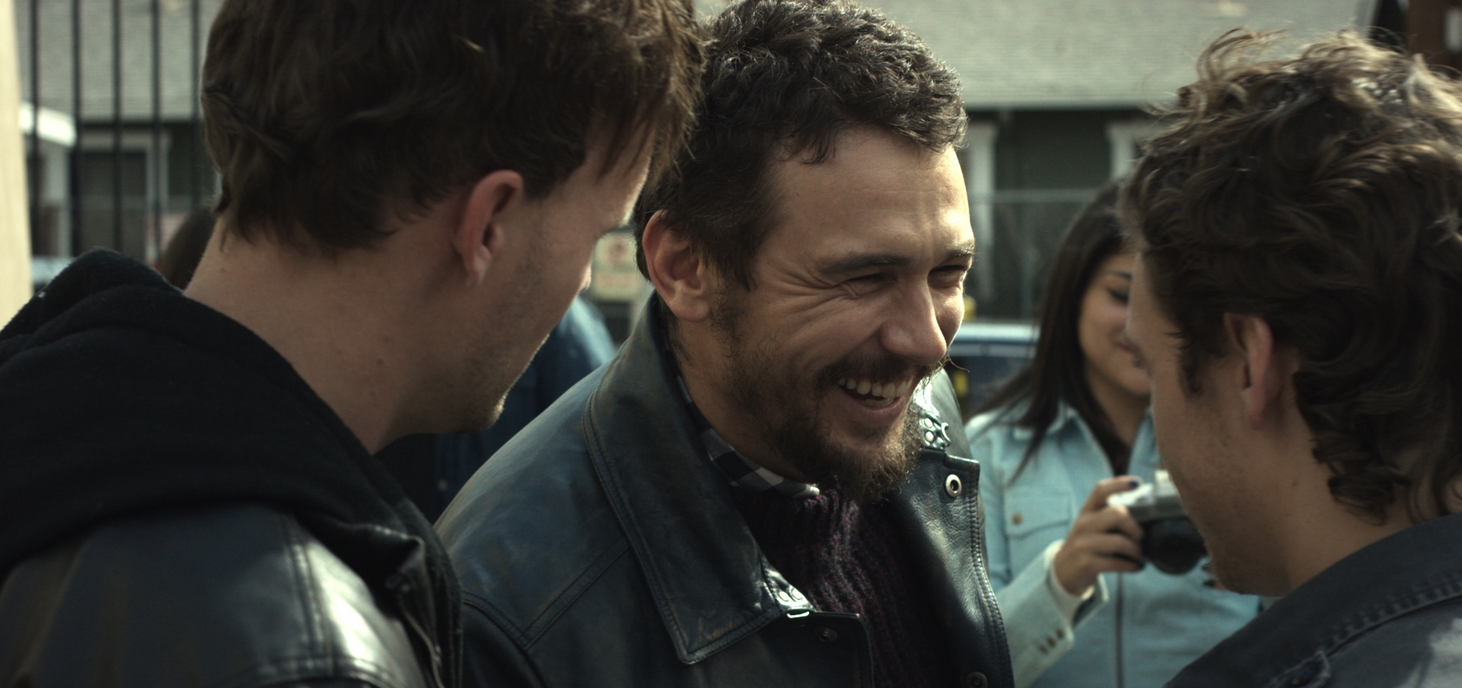
ACTORS ANONYMOUS
For the past few years, James Franco has been running an unreasonably gracious philanthropy effort with the help of the University of Southern California. Teaming up with student writers and directors, Franco’s masters class allows 12 hopefuls to each direct approximately 10 minutes of content, culminating in a patchwork-like feature film that resembles the inner workings of a TV show. Despite the countless filmmakers, these projects come out with a surprising visual singularity, and—certainly in part thanks to Franco—elegantly balance the countless ongoing variables that could cause this type of project to self-implode. ACTORS ANONYMOUS is among USC’s more recent Franco projects. A 2016 production, the film tells the story of aspiring actors and the trials and tribulations of failing in the city of angels. It’s quasi-LA LA LAND, sans the glamor, and an absolutely gut-wrenching portrayal of loss, heartbreak, and defeat. ACTORS ANONYMOUS isn’t the most polished outing; certain sequences play out with more precision than others, and the production value can seesaw between potent indie and flat lo-fi. But what matters most is that ACTORS ANONYMOUS acts as a launching pad, a proverbial guinea pig for hopeful directors, and with that in mind it succeeds with flying colors. Here’s to hoping more artists offer this concept to neighboring film schools. [Sergio Zaciu]
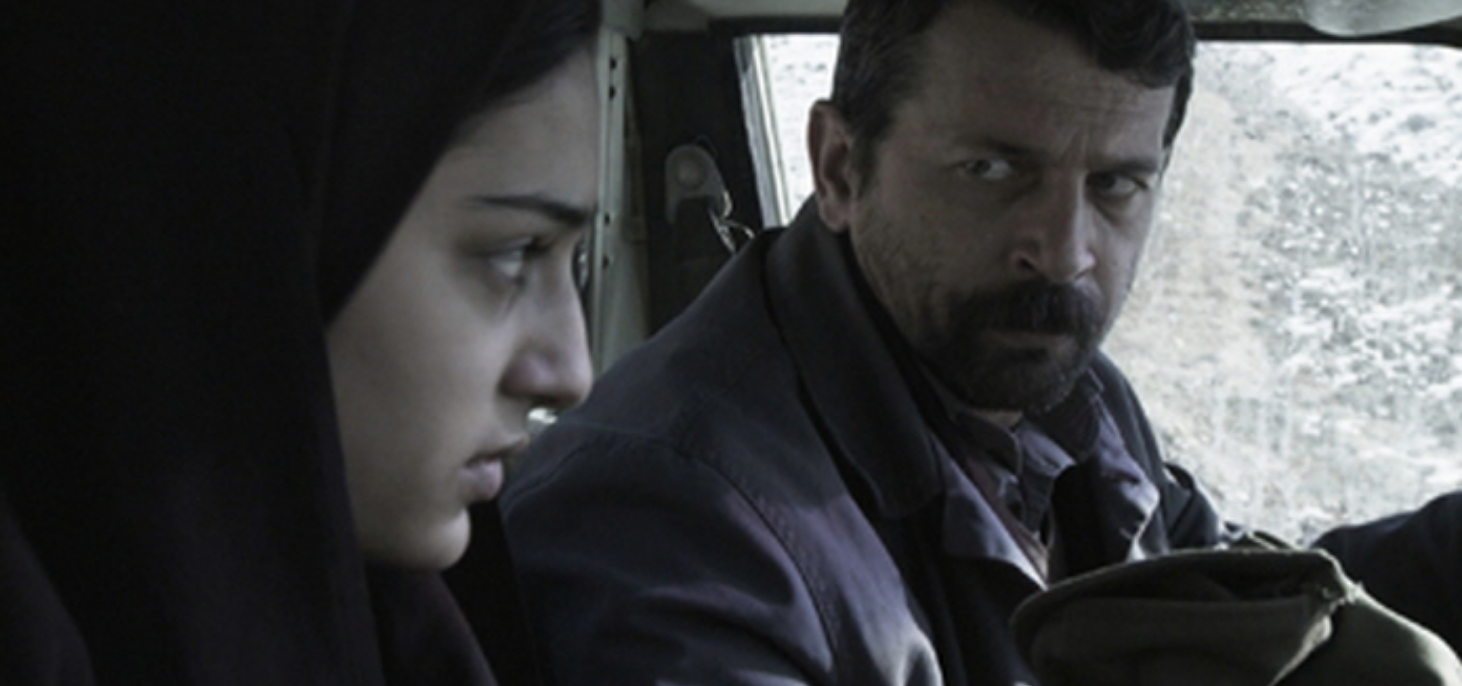
ANOTHER TIME
I’m going to go on record right now and say it: ANOTHER TIME is a better film than 2016’s Oscar winner, THE SALESMAN, and I think I speak for everyone that was in the audience that it’s easily among the most emotionally provocative films I’ve seen at the festival. A rare Iranian film penned by a female director, ANOTHER TIME tells the story of a young girl who gives birth out of wedlock, much to the chagrin of her family. Wearing its influences on its sleeve, Nahid Hassanzadeh’s film traverses the muddy waters of moral quandary with the same expertise as any Asghar Farhadi film. The ethical dilemma sparks immense domestic tragedy, and the rural setting brilliantly elevates the film from being yet another Tehran-set family drama. The roots of Abbas Kiarostami shine bright here as well, focusing on the vulnerable, human touches that make every flawed character such a compassionate portrait. This isn’t a film of black and white issues, but one marred in greys. Exceptionally written, beautifully shot, and rapturously performed, Hassanzadeh has crafted one of the most riveting films to come out of Iran in quite some time. The impeccable casting decisions and the cold, wintry climate wonderfully capture the emotional dissonance at the core of the narrative. This is marvelous filmmaking, directed with precision, passion, and perseverance. ANOTHER TIME is a march of solidarity for its forsaken protagonist, and a noble accomplishment for a female director, giving a voice to a powerless people. [Sergio Zaciu]
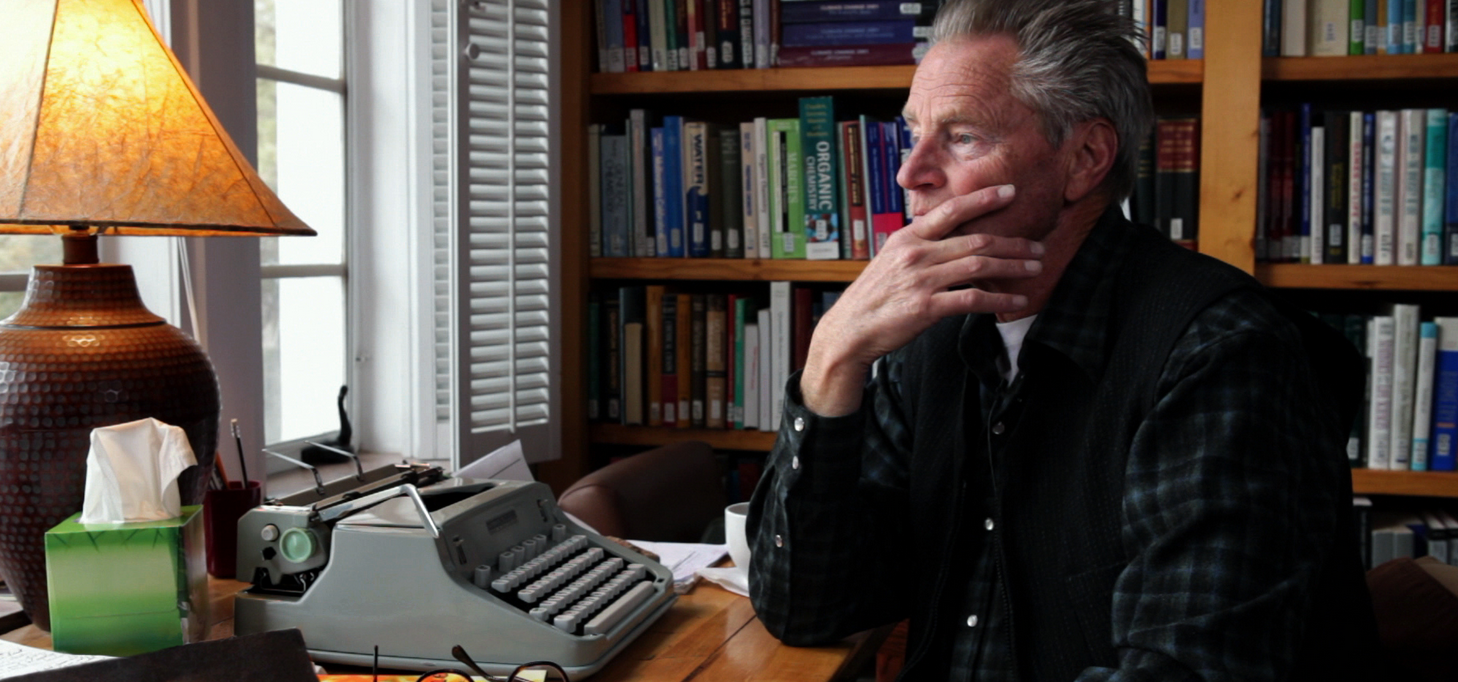
CALIFORNIA TYPEWRITER
To call the American typewriter enigmatic would be somewhat of an understatement. It is perhaps among the few old-age inventions that have become all but defunct now. We still enjoy the sound of our vinyl records, and still have our landline telephones, but the typewriter has become almost entirely obsolete, an item replaced by the personal computer. With CALIFORNIA TYPEWRITER, director Doug Nichol mediates a discourse on creativity, the writing process, and the men who run Berkeley’s eponymous typewriter-repair store. Nichol’s finest accomplishment is the sheer diversity of his material. With anecdotes from Sam, Shepard, Tom Hanks, and John Mayer, as well as an expansive look into the lives of collectors, artists, and mechanics, CALIFORNIA TYPEWRITER is a uniquely ingenious dissertation on permanence and our addictions in the digital age. And that is perhaps Nichol’s greatest accomplishment. Never forgetting that these typewriter enthusiasts are brutally beholden to the conveniences of the digital age, we witness hilarious ironies, awkward hypocrisies, and a loving respect for days gone by. The film’s two highlights involve a man’s desperate search to add an original Milwaukee-made Sholes typewriter to his collection, and an artist’s quest to deconstruct typewriters in order to build unbelievable sculptures using their individual parts. It’s fascinating just how much momentum Nichol embeds this seemingly innocuous subject with. The editing is phenomenal in its intensity, and the way he showcases the envy and conflicting intentions of his protagonists is rather brilliant. Some aim to preserve, others aim to utilize, and a small few like to deconstruct; it’s this variety that gives CALIFORNIA TYPEWRITER its life. Now excuse me, I think I’m going to drive up to Berkeley. [Sergio Zaciu]
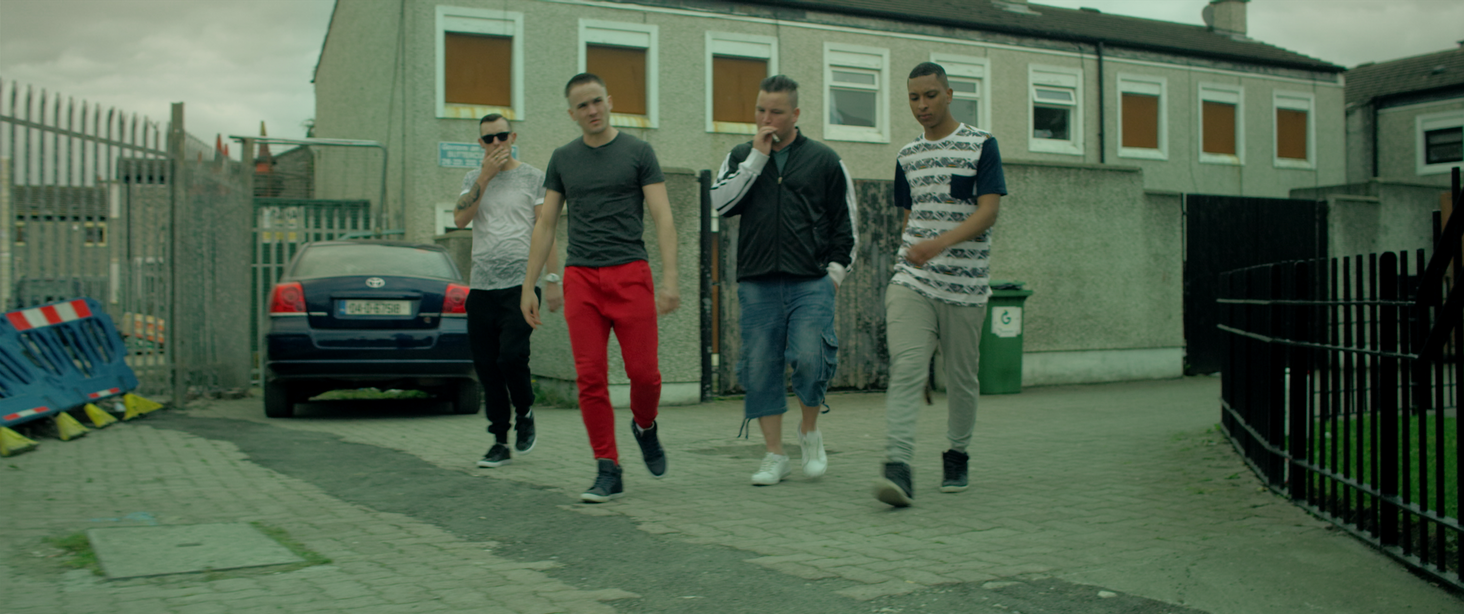
CARDBOARD GANGSTERS
Boasting the feverish temperament of a Guy Ritchie picture, the ghetto angst of Danny Boyle’s TRAINSPOTTING, and the kitchen sink realism of Ken Loach and Mike Leigh’s finest films, CARDBOARD GANGSTERS is an unflinching, sadistic, and unabashedly realistic portrayal of the Irish drug trade. Following a group of—rather incompetent—friends that dream of running their town’s local heroin trade, director Mark O’Connor uses his camera to toy, and subvert, the conventions of genre-films that precede his feature outing. Adding a postmodern twist to his naturalist film, his camera glides through Darndale, tracking his fellow lads in their debauchery. The belligerence is a particular highlight here, clearly demarcating the double-edged sword of the drug trade. With their fatherless lead characters, O’Connor and fellow screenwriter John Connors (who also performs brilliantly in the lead role) comment on the cyclical trauma that faces the residents of Darndale, whether young or old. It’s this earnestness that gives CARDBOARD GANGSTERS its resilience. It is just as cruel as it is honest, a film that aims to make a statement and succeeds with flying colors. O’Connor should be proud; not only is his film a festival highlight, but a noteworthy canonical induction into films from Ireland and the UK. [Sergio Zaciu]

THE CARNIVAL OF DREAMS
Director Lauren Vance embarked on an inspiring and blissfully illuminating journey into Slab City, a DIY-community in the surrounding area of the Salton Sea. Joined by photographer Ian Ruhter and acclaimed actor Gary Oldman, Vance explores the lives of the people that live in this fringe community. The catch? Ruhter is of a dying breed. As a wet plate photographer he practices a craft that is all but extinct in today’s digital-obsessed image capture community, and as a quasi-mentor to Oldman, the two explore the hidden beauty of Slab City by printing their pictures on enormous sheets of glass. To call the images miraculous would be an understatement. Vance’s film is both a tribute to an ignored community in one of California’s least hospitable climates as well as a champion of a dying art form. What makes THE CARNIVAL OF DREAMS so fascinating is that it’s a readily available short film and was born out of a trip to Slab City for the filming of the documentary THE LAST PICTURE SHOW. If THE CARNIVAL OF DREAMS is any indication, then we should all keep our eyes peeled for the feature film as well. [Sergio Zaciu]
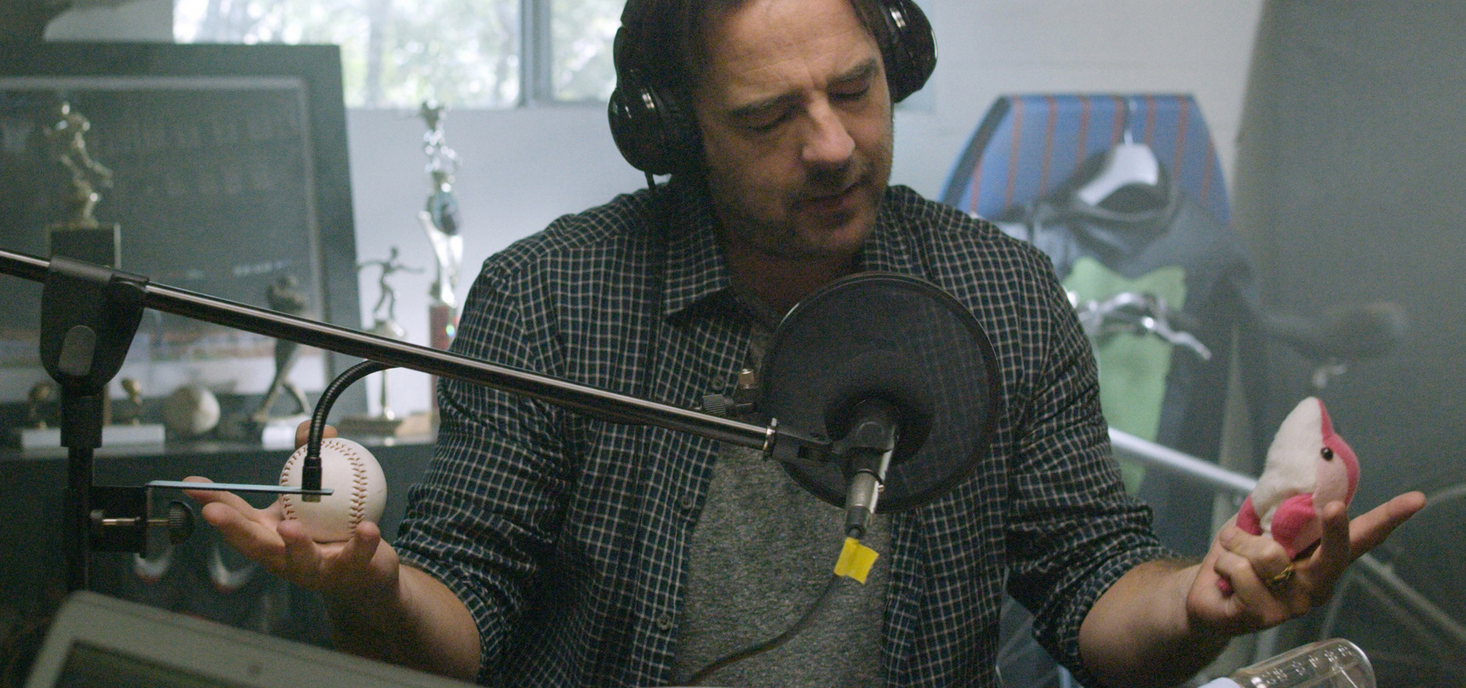
FIXED
Bolstered by its talented cast, FIXED is a humble accomplishment for director Alonso Mayo. Mayo’s film follows a man caught in a turbulent midlife crisis and his existential ennui after his wife suggests he get a vasectomy. The concept is easy enough, and the relative economy of its narrative makes for an outrageous comedic delight. Part THE HANGOVER, part BAD MOMS, FIXED realizes its potential by showing both sides of parenthood’s proverbial coin. It somewhat closely resembles a feature length version of THE LEAGUE with its showered-on dad humor and existential malaise. Mayo digs deep into the psychology of paternity, but never forgets the struggles of maternal care as well. It’s willfully absurd, and charges its narrative with so much comedic levity that it catapults itself all the way to the finish line. The first half drags on a little too long with a handful of repeated beats, but any greater crisis is swiftly averted with a surprising third act twist that breathes fresh life into the narrative. FIXED embraces its own wacky personality and cherishes it. Lead actors Andy Comeau, Nelson Franklin, and Leonard Roberts do a stand-up job forming a three-man wolfpack, embellishing each set piece with an emotional vitality that is often lacking in independent comedies. But the surprise star is Courtney Henggeler, who manages to steal the show with some riotous comedic timing and a clever hint of vulnerability. FIXED is a delight, the rare indie comedy that understands how to balance its own absurdities with the harsh realities of growing old. [Sergio Zaciu]
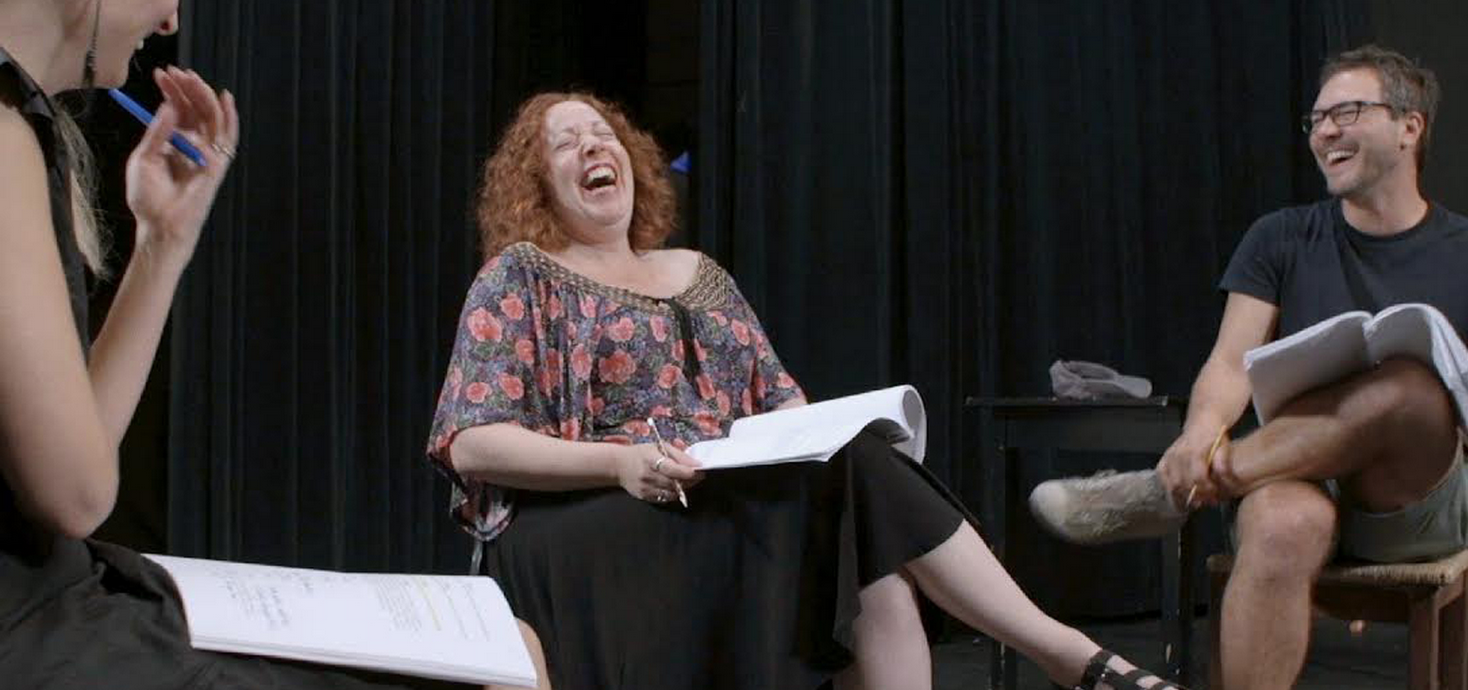
FROM PAGE TO STAGE: FOR THE LOVE OF THEATRE
Anyone who’s participated in independent theatre will find this charming little documentary instantly familiar. The struggle and particular drama of bringing even a modest production to life is almost universal to the theatre experience, but if you’ve never peered beyond the curtain before, it’s hard to fully understand just how much work goes on backstage. While never exactly riveting, the doc carries itself with a panache and charm that’s undeniable. Centering on veteran director/producer Phil Scarpaci (who also directed the documentary), the film follows him as he works to bring his play “Baby, Oh Baby” to life. What’s probably most interesting about the documentary is that it portrays the theatre not as some effervescent, intangible experience, but as a craft that simply requires dedicated work. The scope isn’t exactly deep, and none of the actors seem to give up much of themselves as they’re interviewed for the documentary, but everyone certainly seems to have had a lovely time. It’s a gentle, straightforward outing into a specific world, and that’s all anyone can ask from a doc. [Carter Moon]
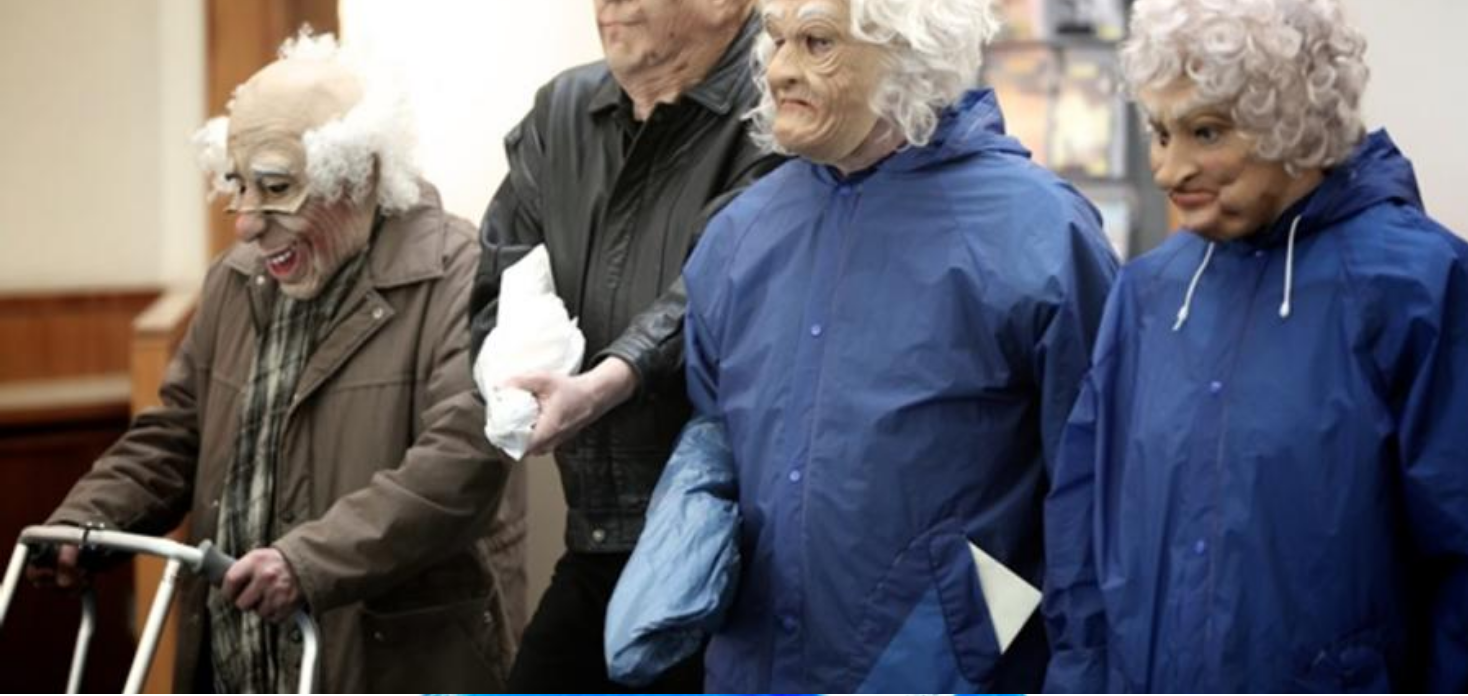
GOLDEN YEARS
From across the pond comes GOLDEN YEARS, a British comedy directed by John Miller and written by the former, Nick Knowles, and Jeremy Sheldon. This sentimental, screwball nugget stars Bernard Hill as Arthur, an elderly club owner whose pension has been unjustly seized. Hence Arthur decides to rob banks in bucolic England, with his wife Martha—played by Virginia McKenna—as the accomplice, in order to save his club from foreclosure and financially aid his motley cohort of chums. The soup thickens when Sid—detective for the local P.D.—obsesses over our robbers’ fortuitous success, as the other detective—a brash and rakish Stringer—attempts to micromanage the case. Despite its micro-budget, the film delivers heartfelt vignettes of comedy and drama; however, at times such vignettes become mawkish, else they fall into the backseat as the intricate plot and the script’s cute plant-reward system overwhelm these wonderful scenes of intimacy, fraternity, and man’s will to decry authoritarianism. Our ensemble cast thrives under Miller’s competent direction; Bernard Hill—aka Théoden—shines bright as one would expect. Occasionally, the derivative filmmaking will subside for a lavish, Edgar Wright-esque style. The screenplay, as mentioned before, is almost hermetically sealed: this is a script which would be praised by professors in a film school—a script fraught with tension, dramatic irony, subplots, and the above-mentioned plant-reward system. Both writer and director are really pandering here; notwithstanding, they do succeed in their Ordinaire quest: GOLDEN YEARS sends chills down the spine and grins to the beleaguered. [John Loftus]
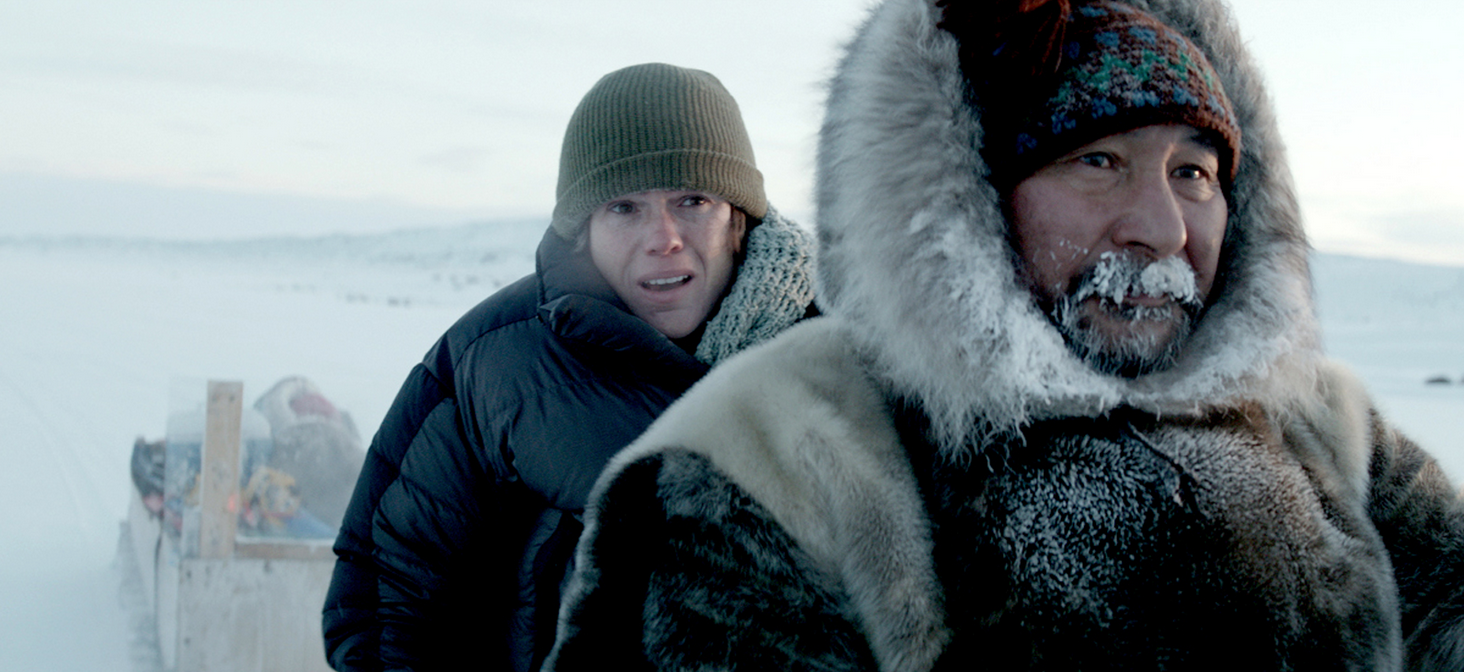
HEAVEN’S FLOOR
In a loving ode to maternal care, HEAVEN’S FLOOR follows Julia, a Los Angeles photographer who travels to the Canadian arctic in a quasi-midlife crisis. Stranded and facing almost certain death, she not only rediscovers herself, but her love for a young girl in need of a new home. The catch? Director Lori Stoll is the real-life Julia, and her adopted daughter Malaya Qaunirq Chapman the film’s producer! In a life-affirming tribute to the Inuk that changed her life forever, Lori Stoll cast the talented Clea Duvall (ARGO, GIRL, INTERRUPTED) to help bring her story to life. As a debut feature, Stoll pulls no punches, filming on location at blistering colds of under -20F and completely opening up her personal life to the camera. Duvall excels in the lead role, emitting an aura of maternal passion, love, and understanding. HEAVEN’S FLOOR will leave any parent in tears. But perhaps the film’s greatest accomplishment is the way it draws attention to a Northern culture that is all but ignored in today’s world. With rising water levels and increasing temperatures, we should hold these lives sacred, and in immortalizing them on the silver screen, Lori Stoll may just be doing God’s work on that eponymous heaven’s floor. [Sergio Zaciu]
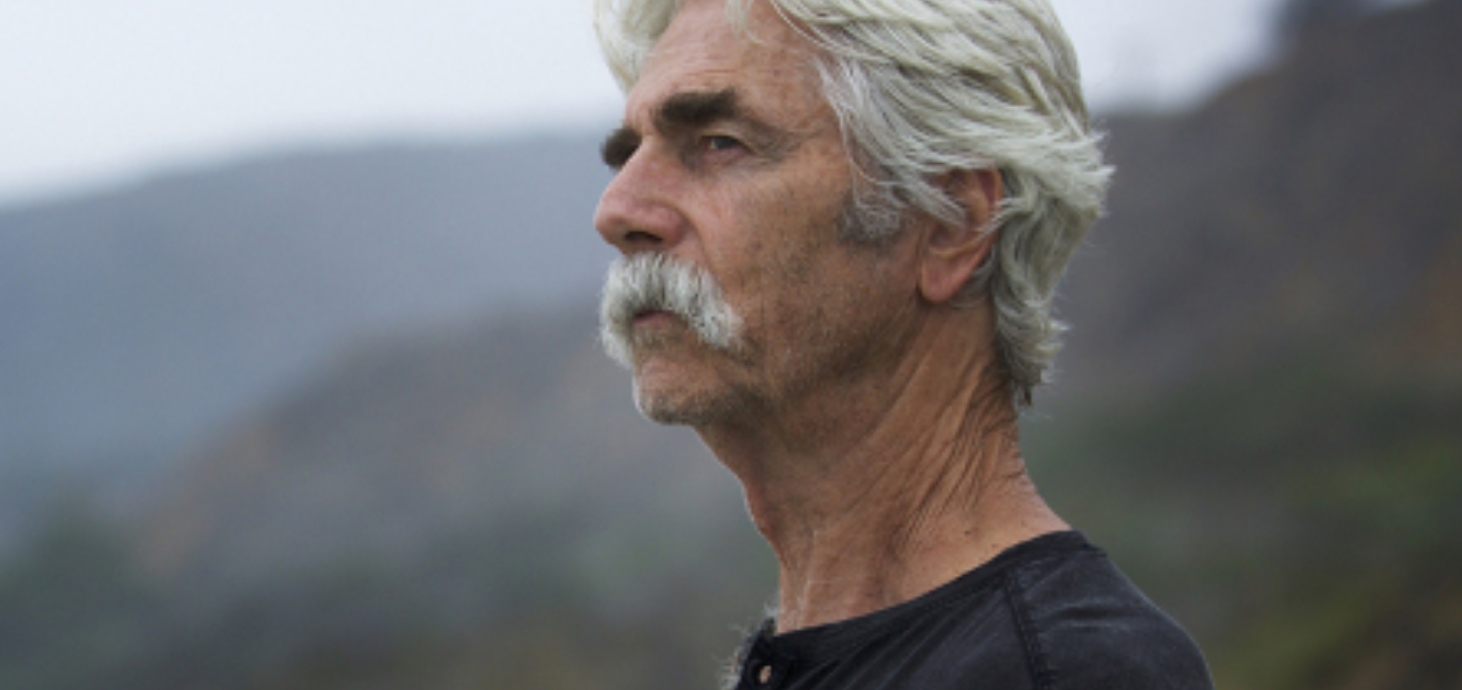
THE HERO
The first time I heard the mellifluous voice of Sam Elliott, was with these words: “Way out west there was this fella . . . fella I wanna tell ya about. Fella by the name of Jeff Lebowski.” Now a few years hence, that old stranger Sam’s back on the silver screen in Brett Haley’s Sundance inductee, THE HERO—a study of an ailing actor, a reflection on the secret fate of all life: mortality. Elliott plays Lee Hayden, former Western movie star, thespian turned voice actor, who’s estranged from his wife Valarie (Katharine Ross) and daughter Lucy (Krysten Ritter), and is romantically beset; also, the tumor on his pancreas becomes the cherry on the sundae. That is until Lee’s drug dealer and former co-star Jeremy (Nick Offerman) introduces him to the candle-burning-at-both-ends, stand-up-comic Charlotte (Laura Prepon), with whom Lee gradually falls in love. Life turns towards the light, if only for a little while, before our characters must “write another chapter,” as Lee says, countenance their fading pasts and becoming futures. Haley’s tradecraft direction allows for Elliott’s performance to shine, despite his character being the forlorn old-timer born again trope. The supporting cast underpins admirably: Offerman provides fantastic comic relief, Ritter, a depth to the all-too-familiar estranged daughter trope, and Prepon, spice, spunk, and sentiment. With this being said, THE HERO does sputter at times due to writer Marc Basch’s and Haley’s cut-and-dry plotting. However, its actors and actresses prevail, leaving the audience with moments that will get the spine tingling and the laughs rolling, just like those Pacific waves. [John Loftus]
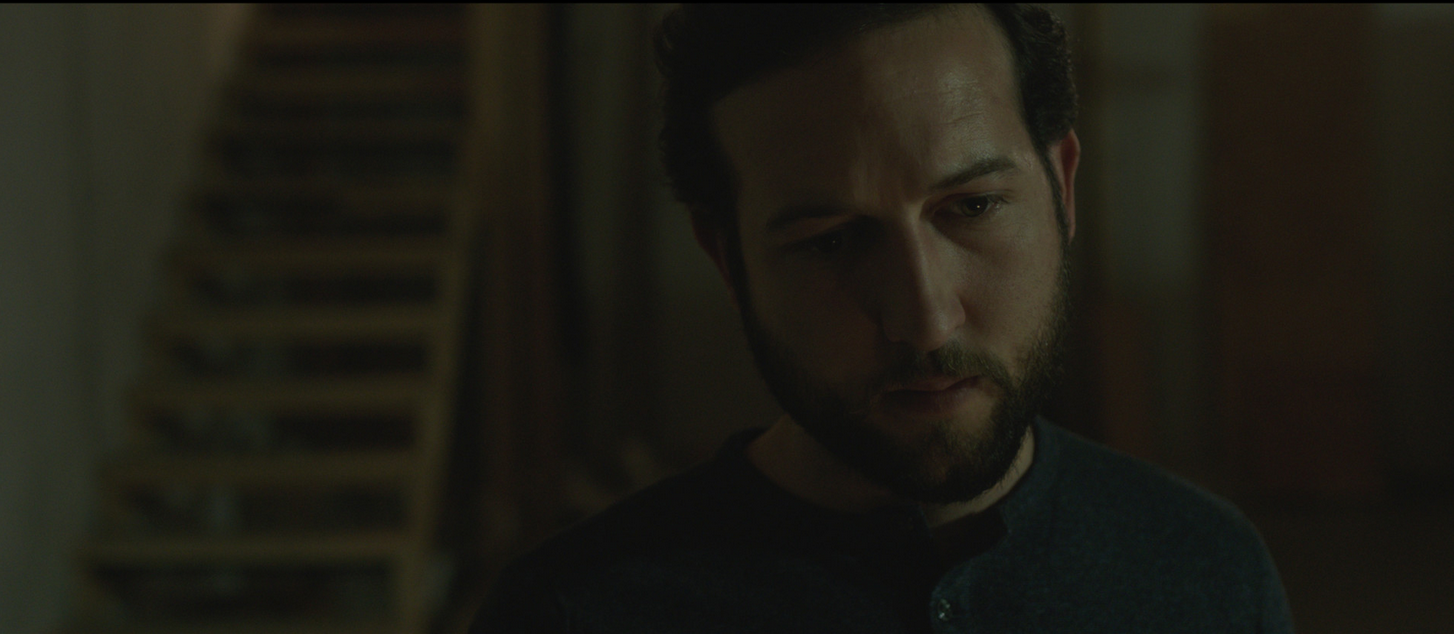
I HATE THE MAN IN MY BASEMENT
Innumerable films have featured a dramatic narrative core involving a character coming to terms with the death of a spouse or loved one, but Dustin Cook’s debut feature injects some fresh air into the concept through offering a kidnapping narrative as a parallel. Claude (Chris Marquette) is slowly coming to terms with the absence of his late wife, who was killed in a robbery gone wrong. As he dips his toes back into the world of dating at the constant behest of his best friend Riley (Jeffrey Doornbos), it becomes increasingly more difficult to keep his secret safely locked away: he tracked down his wife’s killer, Logan (Manny Montana), and has been torturing him in his basement, unsure of how to proceed further. This could easily derail into a dour Eli Roth screamfest, but Cook elects to spend just as much time, if not more, on light and breezy scenes of Claude and his newfound girlfriend, Kyra (Nora-Jane Noone), getting to know each other and working through several layers of Claude’s guilt and anxiety over falling in love once more. While things occasionally enter the realm of unadulterated cheese, Marquette in particular deserves credit for his confident, assured acting chops, making us fall in love with the halting, pure-hearted Claude trying to impress Kyra all while we process his hatred and rage towards Manny with apprehension. With a subplot involving the increasingly friendly rapport between Claude and Manny as Claude moves further along with Kyra, I HATE THE MAN WHO LIVES IN MY BASEMENT may err on the side of tonal inconsistency, but features scenes of joy, heartbreak, and chills in equal measure. [Thomas Seraydarian]

I’LL PUSH YOU
In somewhat of a parallel to GET OUT’s long-running 100% approval rating on Rotten Tomatoes, it’s easy to see why I’LL PUSH YOU has become the runaway hit of NBFF 2017: finding a reason to out-and-out dislike the documentary would require a heart of stone and enough mental gymnastics to endear oneself to an Olympic team. Justin and Patrick have been friends for over 40 years, with Patrick playing an increasingly larger part in Justin’s daily life as Justin’s rare neuromuscular disease steadily retires the use of his arms and legs. After seeing a Rick Steves special on the 500-mile ancient pilgrimage of Camino de Santiago, the wheelchair-bound Justin expresses his interest in attempting to traverse it; with an utterance of the eponymous phrase, Patrick, Justin, and a small crew set out to make Justin’s dreams a reality. In the 90-some minutes that follow, you’re guaranteed to fall in love with the world again, as the common good and love in humanity shines bright ad infinitum through Justin, Patrick, and their relationship to each other and those around them. While literal obstacles that the group faces on the trail provide an appropriately cinematic progression to the narrative, it’s the interviews with the dynamic duo and their family members that provide the main emotional heft. Justin’s reflections on mortality, agency, and living life to the fullest are ones to chew over, and Patrick’s own realizations involving his inability to ask others for help despite working himself to the point of personal injury to provide the same constitutes an effective thematic undercurrent. It may not reinvent the wheel, but it’s pretty hard to remain stone-faced upon seeing countless strangers from around the world drop everything to help a man achieve his goals against the odds. [Thomas Seraydarian]
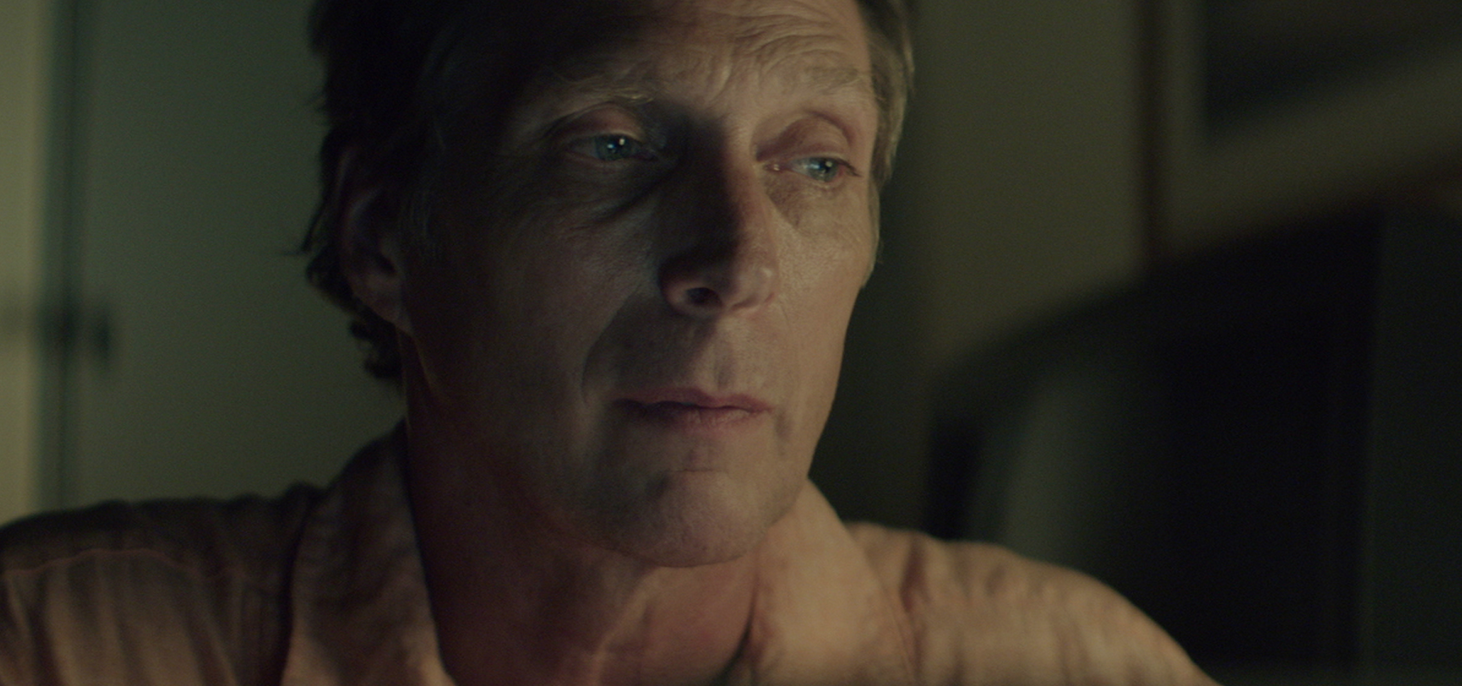
LAST DAYS OF SUMMER
To call LAST DAYS OF SUMMER a festival highlight would be an understatement. Director Aaron Harvey has crafted a nail-biting domestic drama in the vein of an early Polanski film, utilizing the conventions of Hitchcock’s REAR WINDOW with deft editing and crisp cinematography. Inspired by Francois Truffaut’s THE WOMAN NEXT DOOR, Harvey’s film is a quasi-modernist retelling, following a man’s midlife crisis amidst his infatuation with his new neighbor. Delving deep into the complexities of flawed, toxic masculinity, LAST DAYS OF SUMMER creeps with a slow, satisfying burn, each sequence subtly guiding us towards its showstopping finale. The MVP here is William Fitchner (ELYSIUM, THE DARK KNIGHT), who dazzles with a charming, vulnerable naiveté that open the proverbial floodgates of destruction. Adding brilliant bouts of levity to Harvey’s film that keep it from ever feeling stagnant, Fitchner is a veritable maverick. Bolstered by a fantastic ensemble cast, LAST DAYS OF SUMMER conjures up memories of Luca Guadagnino’s A BIGGER SPLASH, a film that in its own right owed a great deal to Polanski’s CUL-DE SAC and the Oscar-winning KNIFE IN THE WATER. Harvey’s film operates in a very similar tonal ballpark. It is restrained, character-centric, and adroitly economical. A veritable menagerie of dense emotional tapestries, LAST DAYS OF SUMMER is exactly the taut, dexterous drama we need more of in independent cinema: a resilient moral quandary, charged with electrifying performances. [Sergio Zaciu]
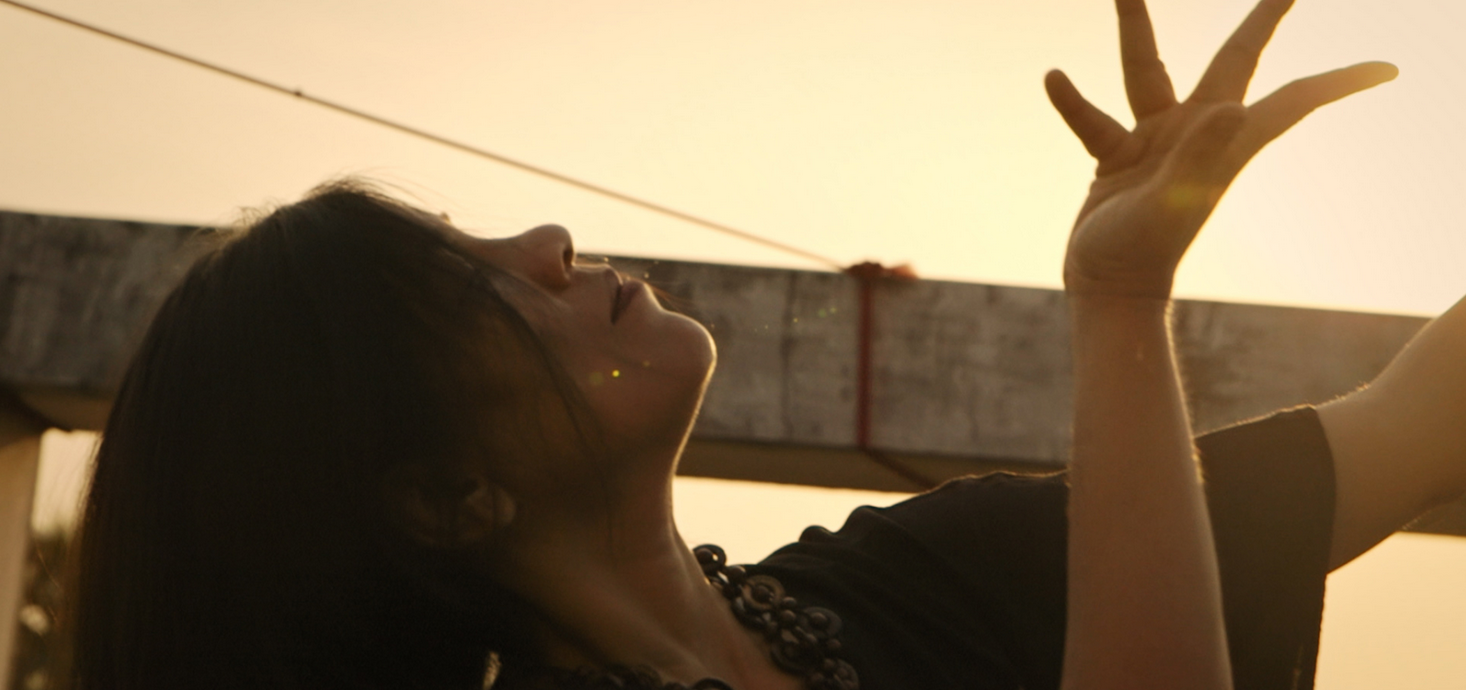
LITTLE STONES
A march of solidarity for female artists, entrepreneurs, and philanthropists across the globe, LITTLE STONES is a director Sophia Kruz’s powerful journey through the minefield of patriarchy and misogyny. It is one of uplifting scale, tantalizing in the way it pays tribute to the subjects it illuminates. There is great tragedy at the heart of these people’s lives, but through art, creativity and self-expression, we learn that any hurdle can be overcome. Kruz takes us from the streets of Brazil to the slums of India, following a total of four women dispersed on opposite sides of the globe. Each uses their creative potential to help the world in different ways, from running a campaign against domestic abuse, to helping women overcome trauma through dance. A portrait featuring an American woman’s sewing workshop in Africa does fall into the white savior trap, and even appears rather capitalist in its outsourcing of manual labor, but the motivations remain earnest enough to earn their keep. Nonetheless, the true highlight of the film is Sister Fa, a Senegalese rapper whose campaign against female circumcision is nothing short of breathtaking. She could easily have an entire feature film dedicated to her work, and alongside the other three women, showcases what we should all try and do with our creative output, regardless of time and place. [Sergio Zaciu]
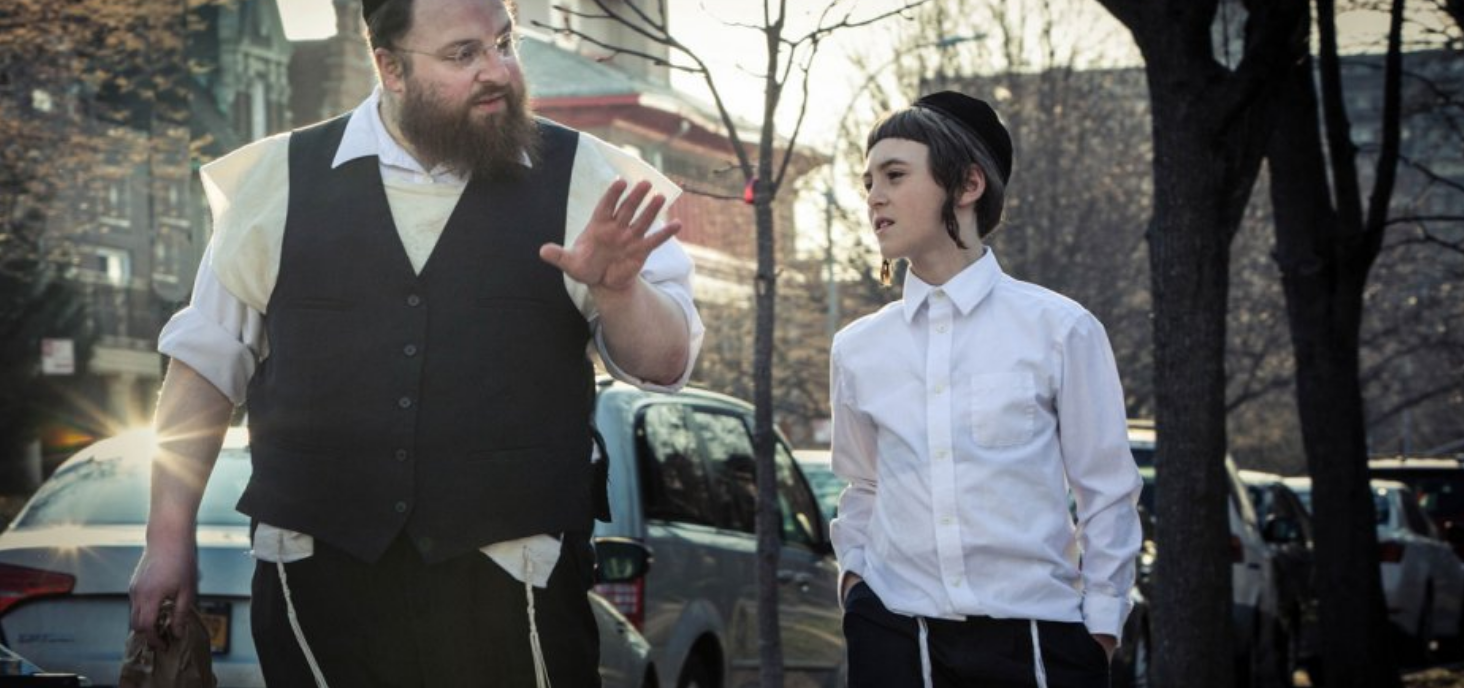
MENASHE
The novelty of director Josua Z Weinstein’s MENASHE cannot be overstated. Set in the Hasidic Jewish community of Manhattan and almost entirely in Hebrew, Weinstein’s film follow the eponymous lead and his quest to prove that he can be a “mensch.” After Menashe’s wife passes away, he faces losing his son; Hasidic children cannot grow up in a motherless home. Lead actor Menashe Lustig performs with enormous vulnerability and breathes incredible life into this stoic, ignored religious minority. Aesthetically, Weinstein channels what’s presented in a similar social-realist Manhattan drama, MAN PUSH CART, but the specificity of the Hasidic community elevates the experience somewhat. Having said that, this novelty does wear itself thin, and Weinstein’s narrative never escalates its drama any further than the immediate external conflict. That doesn’t make it bad, if anything it only makes it more believable, but I’d be remiss to say that MENASHE deserves a slightly more dense, complex moral tapestry. As the film makes its way into its heartbreaking third act, I was hoping Weinstein would surprise me with a last-minute twist, perhaps a more explosive moment of confrontation between a protective father and an overbearing uncle. But I suppose this would be out of character or would strip the film of its trademark realism, for MENASHE ends much like it begins: in a crowd of Hasidic jews roaming the streets of New York, each with their own story to tell, but rarely engaged with. The performances are fantastic and the direction, although visually functional more than formal, packs a serious dramatic punch. MENASHE is certainly among the most invigorating dramas of the festival. [Sergio Zaciu]

MIXED MATCH
Issue documentaries (that is to say, documentaries that focus on a specific problem that requires action, rather than on an interesting place or person) always have the same issue. Unless a problem is incredibly complex, the vital information an audience needs to be informed on a problem can often be conveyed in 20 minutes or less. Werner Herzog, for instance, made an incredibly effective short documentary about texting and driving that chilled me to my core and keeps me from checking my phone while behind the wheel. MIXED MATCH is about an important issue, mixed race blood cancer, and the difficulty its sufferers face in finding a donor that matches the unique genetic background from both of their parents. For the most part, this is a competent doc that introduces us to a number of patients and volunteers who work tirelessly to advocate for mixed race people submitting their genes to a database for bone marrow matches. These are big hearted people, and it’s impossible not to feel for their struggle, but at the same time, it’s hard not to feel like the subject matter would’ve been better suited for a short video on YouTube. This is an issue that could become a viral sensation, a rare time where awareness could potentially resolve the problem, but it’s hard to imagine most people sitting through the whole documentary. That being said, it’s well done, and if you happen to be of mixed heritage, please sign up for a bone marrow database soon, you could save a life. [Carter Moon]
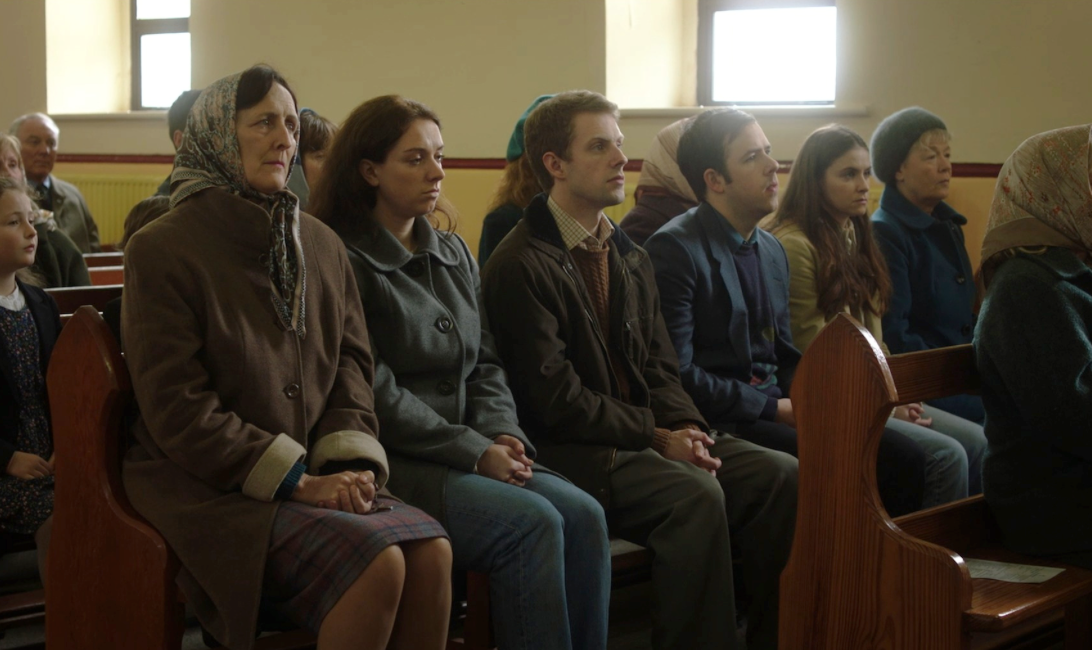
OUT OF INNOCENCE
Among the most tragically charged narrative features in this year’s festival is Irish drama OUT OF INNOCENCE, a nonfiction courtroom story about a woman who is unfairly tried for killing her newborn child. Set in a period of extreme social discord and religious fervency, director Danny Hiller’s 2016 outing captures its milieu with a robust attention to detail, brilliantly forming a social commentary on women’s rights, both now and then. Conjuring up memories of similar Irish dramas a la IN THE NAME OF THE FATHER, Hiller’s film delves into the bureaucratic challenges of investigating crime, all while consuming its protagonists in a series of misunderstandings and mistreatments. The way its parallel narratives develop hearken back to last year’s THE NIGHT OF, a mini-series that challenged the justice system as well as the culture that propagates the stigmatization of alleged criminals. And this is perhaps Hiller’s greatest accomplishment: his protagonists are deeply empathetic and charged with deep tragedy. The true crime elements certainly heighten this. Having said that, it’s admittedly by-the-numbers in approach and it is awfully plodding at points, but it’s never bad filmmaking. It has its moments of laziness, but is rounded out by a powerful narrative, one that will certainly resonate with female viewers. Some brief moments of inspired photography further elevate the experience, making OUT OF INNOCENCE a film that is not to be missed. [Sergio Zaciu]
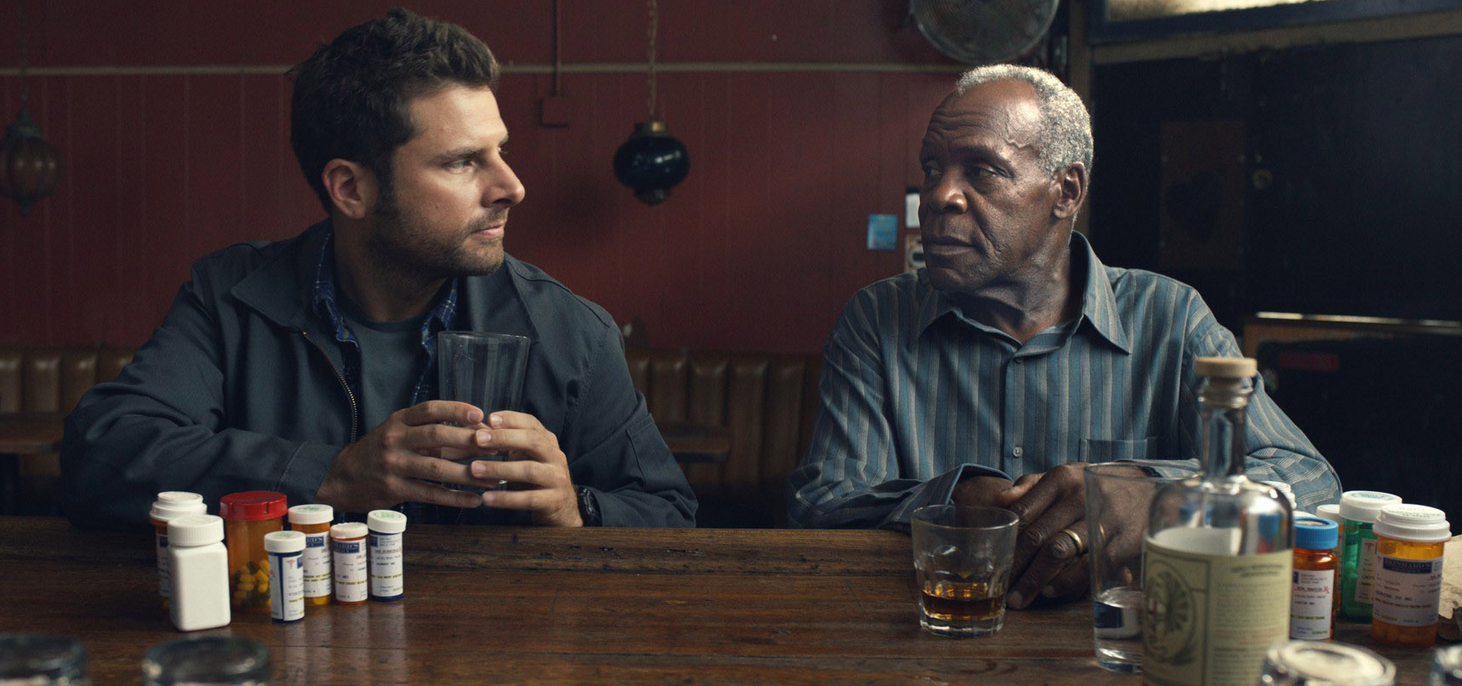
PUSHING DEAD
A charming, often tragic, but more often than not amusing look into the trials and tribulations of an HIV-positive man living in modern day San Francisco. After a $100 check drops him from his health plan, a mourning, HIV-positive writer is forced to navigate through the stress and bureaucracy of the US insurance program. Throw in the paranoia of dating while positive, PUSHING DEAD dares to make fun of a devastating illness. Director Tom E. Brown confidently directs the stage, forming a complex tapestry of laughter and tears, and lead actors James Roday and Danny Glover are wonderfully empathetic in their respective roles. There is something deeply human about PUSHING DEAD that just works. Where the film doesn’t really click is in its narrative structure. Brown does a wonderful job crafting his world and the characters that inhabit it, but his conflicts feel unreliably inconsequential. The way in which the insurance plan crisis is resolved is charming, but undeniably easy, ultimately undermining that most important part of PUSHING DEAD’s message: namely, America’s flawed healthcare system. The inclusion of making his protagonist a slam poet that helps run a downtown dive-bar also comes across as needlessly atemporal, failing to tap into the topical state of Silicon Valley and its affect on San Francisco. That isn’t to say that PUSHING DEAD should have been about an app developer, but it feels like a missed opportunity to really contextualize its fantastic characters in the now. [Sergio Zaciu]

RED CHARGERS
A common complaint I have with documentaries is that they often overstay their welcome. As captivating as a subject may be, it rarely justifies more than 40 minutes of attention, and sure enough, the rest of the doc is usually unrelated filler comprised of footage that was “too good to go to waste.” It’s an unavoidable risk in a genre that requires such intensive planning and production, so the highest praise I can offer Rocky Romano’s RED CHARGERS is that its scope is set so deliberately wide that it never ceases to captivate. Explicitly about the North Canyon surf in Portugal, and the daredevils that risk their lives to ride them, RED CHARGERS takes time to set the stage for how such a community sprung up, including the people who come from across the world to ride the waves, the local culture they interact with, and the geography that makes such ideal conditions possible. Let the record show: This is jaw-dropping stuff, the type of thrill-seeking, monolithic imagery you only see in the finest of sports docs. Where another film would primarily focus on any one of the aforementioned aspects, RED CHARGERS frames the entire scene naturally within its lens, allowing it to feel like a cohesive, densely populated canvas showered in adrenaline, thrill, excitement, action, and—of course—water. [Ed Dutcher]
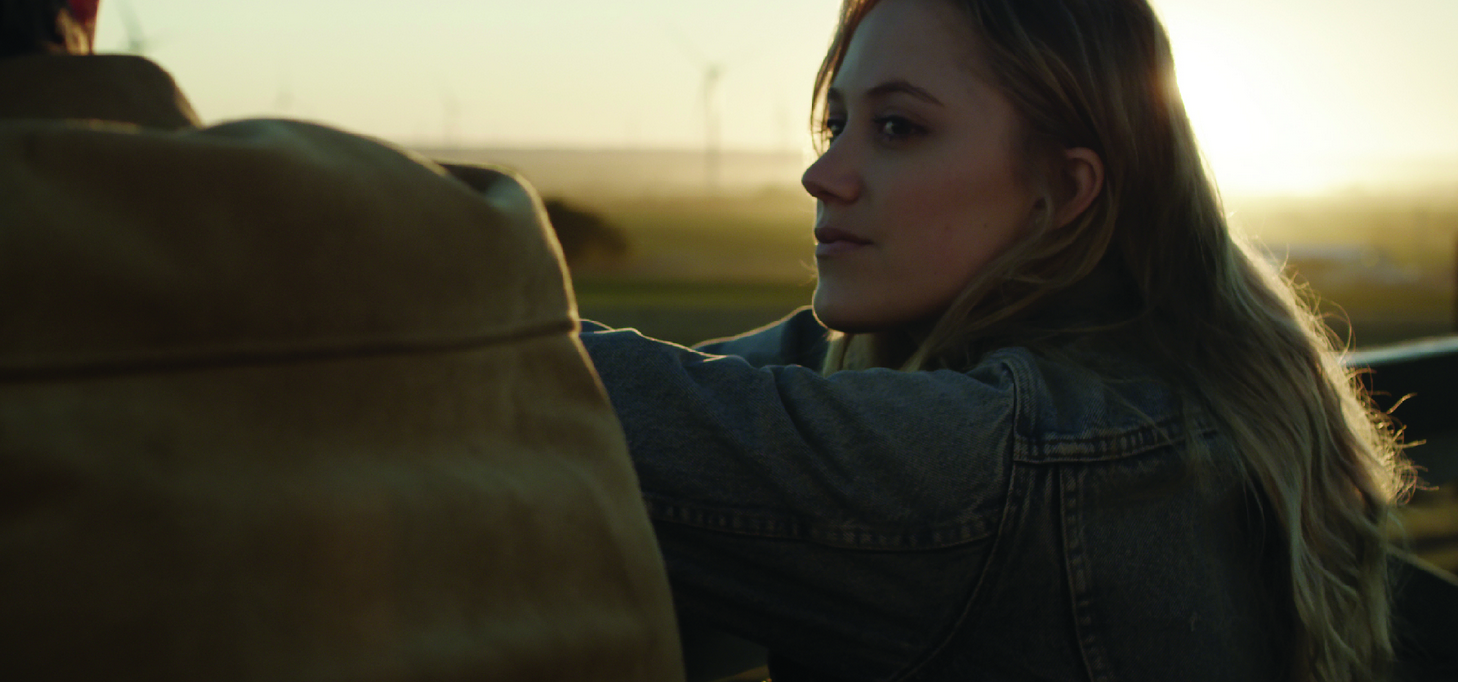
THE SCENT OF RAIN AND LIGHTNING
Stampeding onto the silver screen with the angst of a Taylor Sheridan film, veteran actor Blake Robbins (THE OFFICE, OZ) is dipping his toes into the director’s chair with his sophomore outing, THE SCENT OF RAIN AND LIGHTNING, a taut moral thriller about doubt and mourning. In Robbins’s film, a grieving daughter has no choice but to stand idly by as her parents’ alleged killer receives a commuted sentence. Tightly wound and deftly directed, Robbins film plays out by way of Jeremy Saulnier’s BLUE RUIN, that is if the film had been made by a man in the ilk of David Mackenzie. As leathery as any western revenge film, and as Texan as a 10 gallon hat, Robbins’s film is beautifully shot and competently directed. Performances fluctuate between strong and mediocre, but lead actress Maika Monroe (IT FOLLOWS) proves yet again that she is a force to be reckoned with. The only thing holding Robbins’s film back is its tonal stagnancy. As a work of independent filmmaking, it is polished, ethically compelling, and well structured, but it’s a little short on the moment-to-moment levity that it desperately needs to enrich the drama at its core. Nonetheless, THE SCENT OF RAIN AND LIGHTNING shows great promise for a talented director and his skilled lead actress. [Sergio Zaciu]

SLED DOGS
A must-see for animal lovers across the globe. Gandhi once said that we are judged by the way we treat our animals, and with the growing rise in animal rights documentaries, it is becoming all the more apparent that we are in serious trouble. A visceral shock to the senses, SLED DOGS is a passionate investigation into the lives of Alaska’s canines and the inhumane treatment they undergo before and after the Iditarod, a brutal, 1000-mile race through the Alaskan tundra. Gorgeously shot images of Alaska’s wilderness clash brilliantly with the brutal verité of the exposé at hand. As we dig deeper and deeper into the ethical and legal complexities involving dog ownership and their roles as athletes, SLED DOGS veers away from the romanticization of Alaska’s heritage and into a clinical study of abuse. Brutal and unforgiving, SLED DOGS conjures images of THE COVE or BLACKFISH. If our attention as Western viewers has been so firmly placed at the misconduct of Japanese fisheries, we ought to take a second and look in the mirror as well. Director Fern Levitt cohesively dissects the sled dog industry and the lives of mushers, pitting the rituals of Alaska, the interests of athletes, and the motivations of kennel owners against the welfare of the canines. Levitt begs to question whether or not a humane sled dog operation can even exist, and in playing with this rhetoric, forms a tragic, heartrending portrait of an overlooked crisis. SLED DOGS is riveting, illuminating, necessary viewing. [Sergio Zaciu]
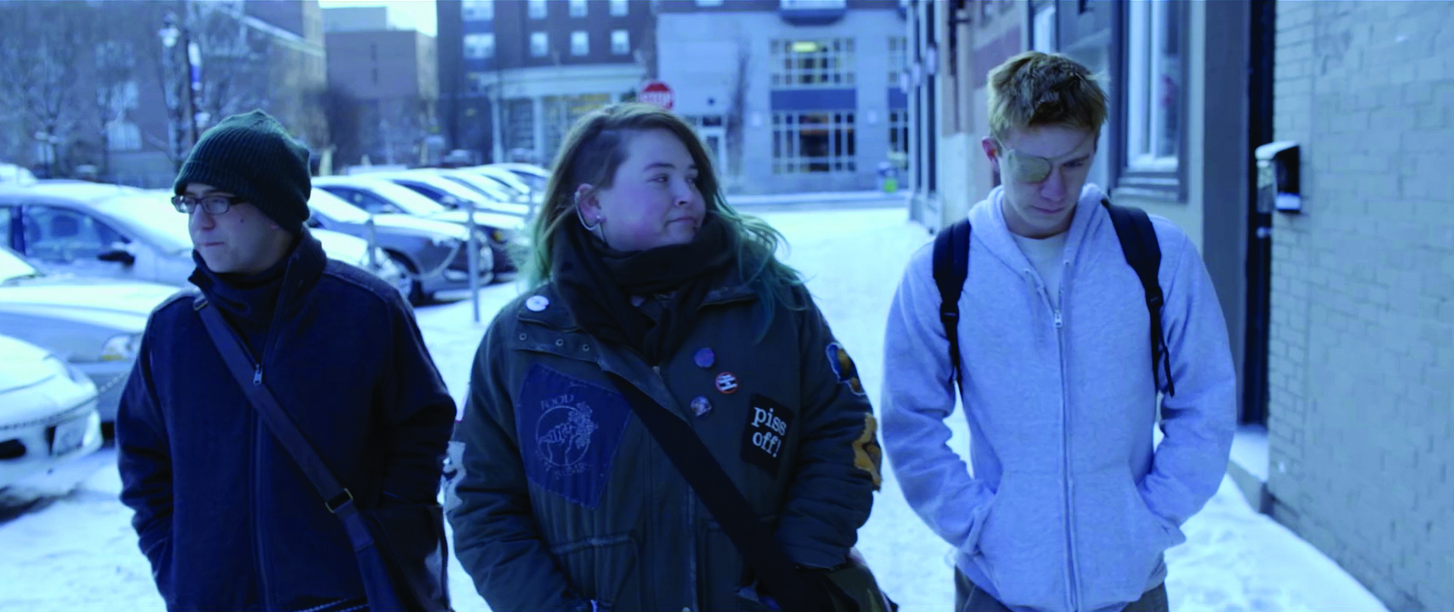
SOME FREAKS
For a medium obsessed with the portrayal of the American high school experience, film has struggled to capture the “reject” in a convincing way. Hollywood actors are by definition incredibly attractive people, and when you cast Molly Ringwald, Joseph Gordon-Levitt, or Winona Ryder as your social outcast, it does a major disservice to the role. Ian MacAllister McDonald’s directorial debut, SOME FREAKS, cuts the crap that soulful introverts or quirky rebels that shop at Buffalo Exchange are the ones plagued by bullies, acknowledging full well that it’s ugly people who bear the brunt of teen torment. The aptly titled SOME FREAKS focuses on the romance between two of the most tragically unappealing seniors in cinematic history: a one-eyed boy forced to wear an embarrassing patch and an overweight scene girl riddled with piercings (as well as their wacky gay best friend) as they graduate into college. Despite clocking in at the minimum hour-and-a-half runtime, SOME FREAKS’ harrowing ride through the pair’s relationship continues to resonate long after the credits roll. Captivating performances and an absence of glitz aside, the most authentic aspect of SOME FREAKS is its refusal to canonize its oddball protagonists. Our characters are often shown to be just as ugly on the inside as they are on the outside, and it’s these internal flaws, not the superficial, that drive the conflict. To make things even more interesting, McDonald expertly subverts genre tropes by making the film’s most sympathetic character an Adonis-like Frat star, a handsome man who can’t seem to fit in with the culture that he is forced to associate with. It’s these ingenious inversions that elevate SOME FREAKS, and thankfully make for the rare high school romance that perfectly suits the expectations of this stale genre for the 21st century. [Ed Dutcher]

TAKE MY NOSE . . . PLEASE!
Unrealistic beauty standards are more quintessentially Hollywood than the Academy Awards. It’s hard to imagine a fresh take on a topic covered so exhaustively, but Joan Kron pulls it off. The “beauty standards” debate falls so heavily on already naturally beautiful, blockbusting starlets, it’s beyond refreshing to see this issue viewed through a lens of everyday women in comedy. She enlists celebrity guests, doctors, sociologists, and psychologists, as well as perfect musical accompaniment and clips to make her case. It’s incredibly exhaustive for its nipped and tucked 90-minute runtime, and it all revolves around up-and-coming comedienne Emily Askins and established headliner Jackie Hoffman deciding to go under the knife for the first time. Kron explores the myriad reasons women undergo cosmetic surgery, from a general dissatisfaction with their bodies to a need to exercise agency as a reaction to abuse. She examines the specific role comediennes play in normalizing cosmetic surgery by being the only women “allowed” to openly talk about it in the form of jokes. She goes to great lengths to humanize and normalize her subjects, exploring not only how they did it but why. In a perfect finale, a sequence of talking heads from the cast and crew plays over the credits wherein they disclose their “cosmetic” alterations, such horrors as braces, tattoos, and . . . haircuts! Her argument could not be clearer: there is undue criticism of women for wanting to simply feel better about themselves, and more power to them to do what makes them happy! Kohn treats her subject with wisdom, grace, and humor, and breathes new life into an age-old discussion. What more could you ask from a documentary? [Kate Brogden]
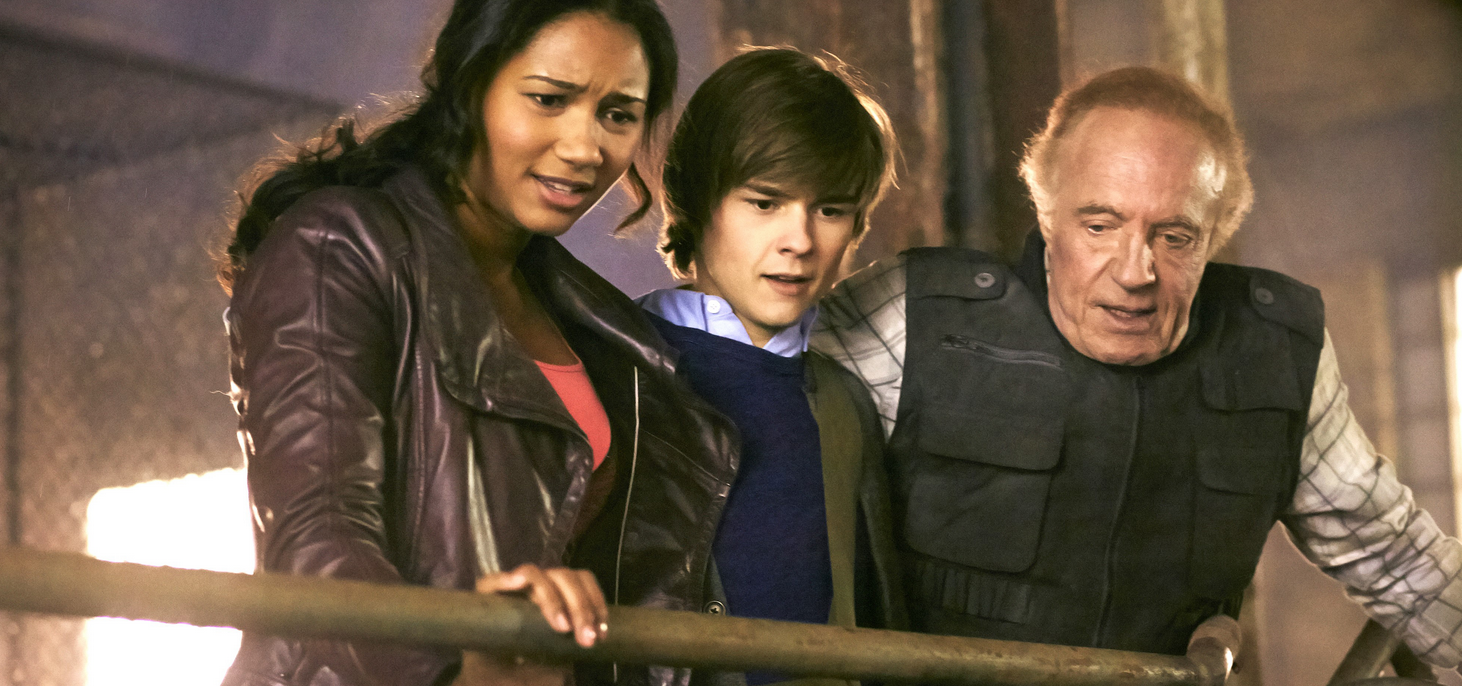
UNDERCOVER GRANDPA
CITIZEN KANE it isn’t, but UNDERCOVER GRANDPA is oozing with a genial charm hearkening back to the breezy capers of ‘80s family cinema. Jake Bouchard (Dylan Everett) is a lovable loser who pals around with his nerdy friend Wendell (Jesse Bostick), dreaming of the day he can score a date with local heartthrob Angie (Greta Onieogou). When he gets his chance against all odds, he is horrified to discover that Angie’s been kidnapped from the spot where he was supposed to pick her up. Now it’s up to him and his doddering, ex-military Grandpa (James Caan) to fight against terrorists and the government itself to return her to safety. While the film rolls out in a familiar matter, that doesn’t stop it from being tightly constructed, with the perfect blend of humor, emotional beats involving the burgeoning love and respect between Jake and his Grandpa, and all of the amusing scenes of geriatric derring-do that you’d expect. However, what really elevates this above the realm of a Redbox rental are the heartfelt and genuine performances, with a star turn from Everett that firmly establishes a long future career in Tinseltown, an affably crotchety appearance by Caan, and a delightful supporting assist from Jessica Walter. While it could have used a more creative force of antagonism than a recycled group of gun-happy Russians, there’s no denying its heart and good intentions, and older viewers will spend a pleasant trip down memory lane, back to the VHS tapes they picked up with their parents at the local video store. [Thomas Seraydarian]
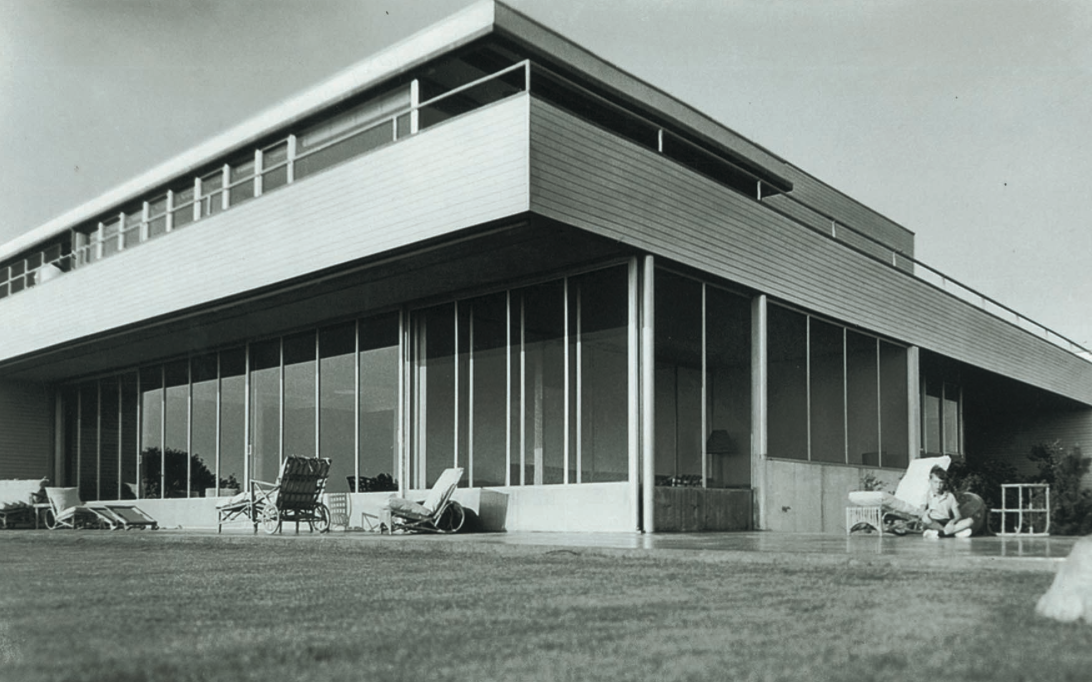
WINDSHIELD: A VANISHED VISION
Director Elissa Brown opens up her family legacy in order to shed light on the architectural development of American modernism. In an epic, ambitious retelling of her father’s quest to commission Richard Neutra’s first East Coast project, WINDSHIELD: A VANISHED VISION tracks the construction and subsequent destruction of the eponymous home. An illuminating venture into America’s architectural history showcases John Nicholas Brown’s unbelievable scope and passion for the future of American housing. Ironically, the titular home boasts all the nooks and crannies of a bourgeois English manor despite its sleek, modern exterior, a noticeable feature that adds to its enormity and separates it somewhat from the streamlined, minimalist look of many of Neutra’s other projects, but that only made it all the more fascinating. It’s a shame that the film never tries anything particularly out of the ordinary with its aesthetics; the storytelling is very cut and dry and stumbles as a result. But despite its rather bland structure, there is something undeniably compelling about the story at the forefront of the Windshield house. For anyone interested in the history of modern architecture, WINDSHIELD: A VANISHED VISION is a must-see. It is equal parts tragic as it is inspiring, and wonderfully captures the dreams of 193’s designers. While watching, take that into account; this all occurred nearly 80 years ago. [Sergio Zaciu]

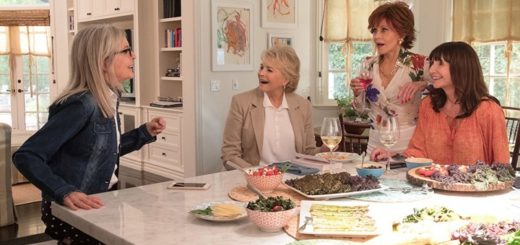
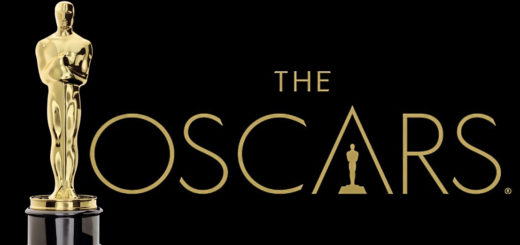
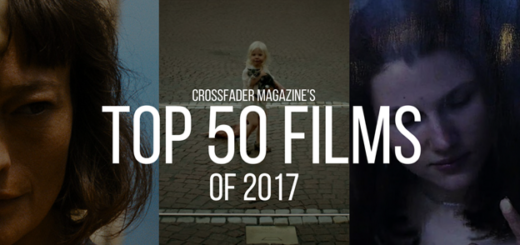
Thanks for your excellent reviews! Will post